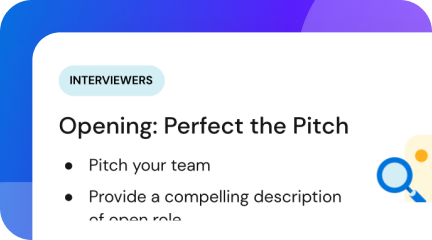A skilled marketing manager can make a big impact across an organization, and hiring the right candidate starts with asking the right interview questions.
This collection of questions can help you find a marketing manager that learns quickly, understands data, and makes a significant impact on marketing objectives. These questions speak to hard skills like product management and reporting, and also important soft skills like collaboration and problem-solving.
Table of Contents
General Marketing Manager Interview Questions
Marketing Director Interview Questions
Product Marketing Manager Interview Questions
Digital Marketing Manager Interview Questions
General Marketing Manager Interview Questions
1. How do you determine the best marketing channels for your target audience?
This question requires the candidate to have a clear understanding of their audience, available channels, and competitors. All of these components are essential to building successful marketing campaigns. Beyond being able to articulate the best channels, listen for an indication that the candidate is willing to experiment. Proactively identifying and testing different marketing strategies is an important skill for managers to have.
2. Describe your most successful campaign. Why was it effective, and what role did you play?
The candidate should be able to highlight a specific example and be able to walk you through the campaign from start to finish. They should speak to qualitative and quantitative results and their role in achieving success. If the candidate seems proud of their accomplishment, that’s a good sign. Studies show that people who exhibit pride in their achievements tend to perform well and persevere in similar tasks.
3. You have an idea for a new campaign, but leadership doesn’t get it. How do you encourage executive buy-in?
Selling ideas to leadership can be a tricky balance, and it requires skills in both persuasion and compromise. There are a few techniques that are commonly used to earn executive buy-in. A good answer will show that:
- The candidate knows how to tailor their pitch to their audience.
- The candidate can frame the issues that their campaign solves in a productive way that meets the org’s expectations.
- The candidate has a high degree of emotional intelligence and can balance their own feelings with those of leadership. Emotional regulation is a key aspect of effective communication.
4. What do you think sets our brand apart from competitors?
This question assesses the candidate’s understanding of your company’s place in the market and what you do better (or worse) than the competition. It also gives the candidate an opportunity to demonstrate their enthusiasm for the opportunity, and if they’ve already spent time researching the relevant industry.
5. What was your biggest professional failure? What did you learn?
Pay close attention to confirm that the candidate accepts fault and doesn’t attempt to shift blame onto others. You should also listen for signs of a growth mindset. Ideally, the candidate isn’t deterred by their failures and actually sees failure as a learning opportunity.
6. Tell me about a time when a project’s demands and scope changed significantly—how did you react, and what was the project’s outcome?
This answer can look a little different depending on the position or industry, but one commonality is that a solutions-first approach is best. It demonstrates that the candidate isn’t a passive manager and knows how to leverage available resources. It should also demonstrate that the candidate is able to pivot quickly when facing a significant obstacle. Regardless of the outcome portion of their answer, the candidate should be able to articulate what they learned from the experience.
Marketing Director Interview Questions
7. There’s a disconnect between the CEO and COO on a homepage design. The CEO likes one mock-up, and the COO likes another. How do you proceed?
Pay close attention to how the candidate handles indecision and offers concrete solutions for getting unstuck. A good candidate should include data and market research in design decisions. Suggesting the strategy of A/B testing each design instead of relying on “gut feelings” is a good sign that they are data-driven, which can help navigate a split opinion of leadership.
8. Can you share when you took a different, novel, or outside-the-box approach on a strategic initiative?
Creativity is a key ingredient in successful marketing, so ideally the candidate will be able to answer this question without too much thought. Also listen for the candidate to explain the outcome of their novel approach, what they learned, and what they might want to replicate for next time.
9. Was there a time when you had to share a difficult piece of information? What was your approach, and what was the outcome?
Assigning fault or accepting blame is a challenging (but important!) part of any professional role. Try to get a feeling of how direct the candidate is when they communicate and if they give others an opportunity to process their emotions.
10. How do you think we currently serve our target market, and how could we do it better?
The candidate should demonstrate a clear understanding of your target market. It’s also good if they can identify new market segments and understand your audience’s pain points. This helps show their understanding of target markets, existing solutions to solve marketing challenges, and the candidate’s overall curiosity (if the market is new to them).
11. What’s your approach to establishing your department’s budget?
The question confirms that the candidate can set long-term financial plans and goals. Tangible benchmarks should be included in the candidate’s answer. Also, listen for considerations of future spending based on where they see the business heading.
Product Marketing Manager Interview Questions
12. How do you ensure that sales teams are correctly positioning your product?
This question measures the candidate’s knowledge of the sales/marketing relationship and their ability to encourage cross-team rapport. Listen for the candidate to discuss sitting in on sales calls or working directly with sales to aid in the development of marketing messaging. This question also provides the candidate an opportunity to demonstrate ownership of a product and role, a growth mindset, and collaboration abilities.
13. What metrics would you use to track the success of a product launch?
Listen for the candidate to demonstrate their ability to tie marketing metrics to revenue. Good indicators of that ability include the mention of form fills and inquiries, upselling and cross-selling in their marketing, and the rate of customer retention they’d like to achieve. It’s also a good sign if the candidate suggests a combination of hard metrics like web traffic and softer metrics like social mentions.
14. What is your product launch process?
The candidate’s answer should tell you about their experience with essential pillars of product marketing, which include:
- Positioning strategy—strategic exercises to establish an image of a brand or product in a consumer’s mind
- Messaging—the language and tone an organization uses to talk about itself and the value it provides
- Leveraging the customer experience—listening to pain points and addressing them in their marketing
- Go-to-market strategies—a plan that details how an organization engages with customers and convinces them to use that organization’s products or services
- Buyer personas—an idealized depiction of a person that represents your target audience
Because product launches have hard deadlines, this question also lets the candidate speak to their organizational and time management skills.
15. You’re working on a project with highly creative people of differing opinions. How do you keep things moving along to hit deadlines?
There are two important parts to their answer that you should listen for:
1. The ability to communicate the importance of deadlines
2. An understanding of setting realistic goals
You might hear the candidate mention SMART goals, which offer a solid framework for achieving results. These goals should consider what’s best for the project and client.
16. What is a product you have seen marketed poorly? Why did it fall flat, and what would you do differently?
Listen for a candidate who is solution-first, who can provide logical and concrete alternatives to perceived problems. Ideally, their critique goes beyond the surface. It’s one thing to criticize a product’s color, but another to explain how the brand lacked an adequate understanding of its target demographic or core marketing channels.
17. What would you do if, after launching a new product feature, user adoption was unsatisfactory?
This question gives the candidate an opportunity to show their understanding of metrics and goals surrounding product launches and feature adoption. An ideal candidate might discuss best practices around launch communications. It’s also good if they suggest reviewing the data about how far users got in the adoption process. For example, the strategy would be different if users are exploring the feature and then abandoning it vs. ignoring it altogether.
Digital Marketing Manager Interview Questions
18. What marketing content gets the best results?
The candidate should be able to articulate different types of content and how it can be customized to align with different channels and objectives. Ideally, they will support their perspective with data and provide a specific example of content they have successfully included in past campaigns.
19. When selecting marketing KPIs, what criteria do you use, and how do you measure success?
This answer shows that the candidate understands how to align KPIs with campaign objectives. It also allows them to explain how they prioritize marketing efforts and the importance of data in evaluating effectiveness.
20. Walk through a campaign that you worked on from start to finish. What was your general approach, what challenges came up, and were you successful?
This question is a great way to gauge the candidate’s overall understanding of building a dynamic marketing campaign. They should be able to share wins while also being transparent about challenges. In evaluating success, listen for specificity and an ability to tie metrics to revenue.
21. How would you increase our brand’s online presence?
Listen for familiarity with the different channels that comprise digital marketing. The candidate should also demonstrate an understanding of customer pain points and how your brand is able to address those pain points in the digital space. Ideally, they will show a basic understanding of branding, and maybe even offer some examples of brands that are successful in maintaining a strong online presence.
22. Explain an effective digital sales funnel you built. What tools did you use, and what was the outcome?
The candidate should be competent with common digital marketing tools like Google Analytics or HubSpot, and be able to include those tools in building a viable sales funnel. They should also understand the role of marketing in qualifying leads for sales.
23. Tell me about a time you had to act quickly without a lot of data. What did you do, and what was the outcome?
Pay attention to how the candidate suggests using their available resources and how they will project results despite minimal data. Ultimately, this question evaluates the candidate’s ability to make quick decisions under pressure. This also helps establish that they have a sound understanding of their field and that they can draw upon that knowledge in a productive way.
Asking the right questions makes all the difference
Hiring a strong marketing manager has the potential to positively impact an organization for years to come. Using the questions in this article in your interviews is one method for making sure candidates are properly vetted. Using an interview intelligence platform like BrightHire is another proven way to encourage efficient, equitable hiring as your company scales.









